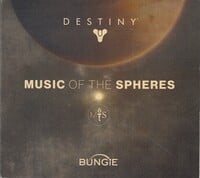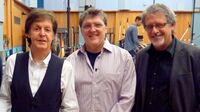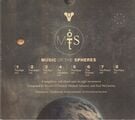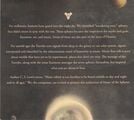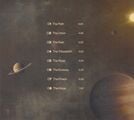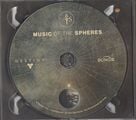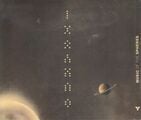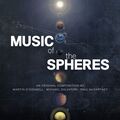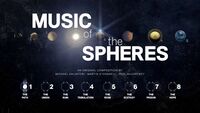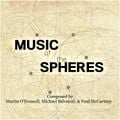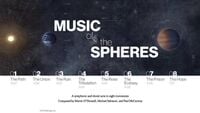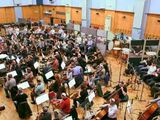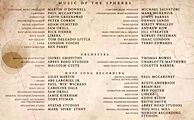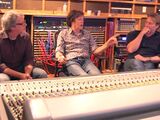Music of the Spheres
From Destinypedia, the Destiny wiki
- "For untold ages the Traveler sent signals from deep in the galaxy to our solar system, signals interpreted and identified by the subconscious mind of humanity as music. Music that tells a story about worlds yet to be experienced, places that don't yet exist. The message of the Traveler, along with the inner harmony amongst the seven spheres themselves, has inspired what you are about to hear."
- — O'Donnell's CD note
Music of the Spheres was the musical foundation for Destiny written by Martin O'Donnell, Michael Salvatori, and Paul McCartney, which started production in 2009 and was sent off to an orchestra in early 2012[1]. The full version of its second movement, titled "The Union", was performed live at Video Games Live 2013[2], and it was announced that Music of the Spheres would be released as a standalone work, having planned to be released in August 2014[3], one month before Destiny's final release date, to be kept with the composers' intention of a "musical prequel" to the full franchise. It consisted of eight movements and a total of 48 minutes.
Track List
1. The Path
2. The Union
3. The Ruin
5. The Rose
6. The Ecstacy
7. The Prison
8. The Hope
Production
In late 2009, Bungie management came to composer Martin O'Donnell, asking him to write music for the game that would be called Destiny. He came up with a concept he described as "centuries old", which was "music for the sake of music". O'Donnell wrote music that "told its own story", and would be released before the full game to introduce people to the music of Destiny. O'Donnell worked on it with his colleague and musical-partner Michael Salvatori, and later recruited famed musician Paul McCartney to the project. [4]
O'Donnell took inspiration from the ancient concept "Musica Universalis"[5], or the idea that the seven spheres humanity knew about at the time moved in relation to music. O'Donnell also used nocturnal geomantic figures as the namesake for the individual tracks. O'Donnell's last inspiration for the work was the Lydian B7 musical scale, which gave every piece a specific key it was written in.[6]
At E3 2013, publisher Activision reworked O'Donnell's audio for a trailer at the last minute. They replaced the music with "library music" and hired an unrelated voice actor for the narration. O'Donnell expressed his frustrations on Twitter, stating the music was not his own. O'Donnell was fired from Bungie on April 11. 2014. A legal battle with O'Donnell and Bungie's CEO-at-the-time Harold Ryan began shortly after. This court case was resolved on September 4th, 2015 in favor of O'Donnell. [7]
Music of the Spheres remained unpublished for several years after, being made available on Bungie's own webstore on June 1, 2018 as part of a vinyl soundtrack collection. [8]
Legacy
Two months after the court suite was settled, a Bungie fan named Owen Spence (formerly known as u/OS_Epsilon at Destiny's Reddit page) began a project to reconstruct Music of the Spheres from publicly available material. After several months, Spence released a 40 minute cut to Reddit in April 2016, which impressed O'Donnell. Spence kept working on it for another year with the help of Spanish speaking fan Tlohtzin Espinosa. Spence and Espinosa's work was released in April 2017, called the "Definitive Edition".[9] O'Donnell stated that while it was not quite "definitive", it was still close to the real work.[10] After the release of the Definitive Edition, Spence found a way to get a cleaner version of a piece of audio Espinosa had failed to acquire. Spence spent a few days making the edit and YouTube channel Planet Destiny posted the final mock up release.
After the final release by Spence, O'Donnell went to Twitter and encouraged anyone who had a copy of Music of the Spheres to share it. [11] A few days before Christmas 2017, Espinosa was contacted by someone who owned a real copy of Music of the Spheres, and he worked with Spence to release it on December 25, 2017. [12] Many fans feared the legal ramifications this would lead to, but for four months, the leak remained online. In April 2018, Spence was contacted by Bungie and sent a Cease and Desist letter, which led to a fan outcry for the music. Bungie's community manager Cozmo23 responded to the backlash on Reddit by saying they were doing it so Bungie could officially release Music of the Spheres. [13]
Poetry
During a trip to England, O'Donnell met a poet named Malcolm Guite at a festival on the Isle of Wight, where they had their first conversation about pre-Copernican astrophysics and C.S. Lewis. Quickly realizing they shared a passion for these ideas, O'Donnell asked Guite to write a collection of poems for Music of the Spheres. Guite wrote a collection of fourteen poems which he called Seven Heavens, Seven Hells; A Sequence for the Spheres[14] and gave them to Bungie to read over. O'Donnell loved the poems and Bungie purchased the rights to them. Guite had his name for his poetry in the first Destiny game's credits.[15]
As years passed and Music of the Spheres was seemingly not going to release, Guite considered putting Seven Heavens, Seven Hells into a number of his books, but an author whom Guite had admired, Michael Ward, said the poems didn't fit into any of the collections he proposed thematically. Seven Heavens, Seven Hells remained unpublished.
Shortly after Spence had leaked Music of the Spheres in December 2017, Spence and his friend Landon Davis reached out to Guite with a proposal to release the poems. Guite obliged and gave the poems to Spence, who then worked with Davis to make a video for the first poems, titled The Moon, and their video was released on July 7, 2017. [16]
In terms of the layout of the poetry, there are fourteen poems arranged in seven pairs. Each poem draws influences from Ward's book Planet Narnia, and the poems are arranged in a format called a roundel, where each poem has a main phrase that is repeated throughout (for instance, The Moon's phrase is "The Moon is Full).
Every two poems are 'opposing pairs'. According to Guite, "Each of the seven spheres has a certain cluster of associations and influences, Venus with Love, Mars with war and martial valour, the Sun with gold, but also poetry and inspiration etc. But equally it is possible for each of these celestial influences to become corrupted and malign, for, as St. Augustine says, good is primal and evil is always a corruption of some original good." As such, the first poem of the opposing pair is diurnal, or the 'heavenly' sphere, and the second in the pair is the nocturnal, or the 'hellish' sphere. [17]
Latin Lyrics
O'Donnell used Latin lyrics in places of normal choir tones in the The Rose, The Prison and The Hope.
The Rose
Ad Victoriam Qua Patet Orbis - To Victory as far as the world extends
Sub Rosa - Beneath the Rose
Semper Fortis - Always brave
Sub Divo - Under the wide open sky
Stamus Contra Malo - We stand against evil
Per Audacia ad Astra - With Bravery to the stars
The Prison
Veritas Et Fortitudo - Truth and Courage
Ab Aeterno - From eternity
Ab Extra - From beyond
Stamus Contra Malo - We stand against evil
Non Timebo Malo - I will fear no evil
Audax at Fidelis - Bold but faithful
Ardus Ad Solem - Striving towards the sun
The Hope
In The Hope, O'Donnell uses the names of the planets as they were in ancient Latin and made his own interpretation of the pronunciation.
Luna, Mercu, Venoo,
Luna, Mercu, Venoo,
Sola, Maroo, Jova,
Sola, Maroo, Jova,
Saturna, Terra
Saturna, Terra
Trivia
- O'Donnell had a number of influences on Music of the Spheres, including Planet Narnia by Michael Ward, De Musica by Boethius, The Vatican Library, Music of the Spheres by Rued Langgaard, Music of the Spheres by Mike Oldfield, and the Golden Record.
- Guite had recordings made of him reading the poetry while he was at Bungie in 2013.
- The musical keys of the pieces goes in order of the Lydian B7 scale (C, D, E, F#, G, A, Bb, C). This same order is used in the Vault of Glass Oracles.
- At one point the development of the music, O'Donnell had the names of the geomantic figures encoded in binary.
Gallery
References
- ^ Scribd.com: Marty O'Donnell v. Bungie, Harold Ryan
- ^ https://www.youtube.com/watch?v=6AXUiCMpRY8
- ^ https://www.youtube.com/watch?v=K1Im5m67Ajs
- ^ https://www.youtube.com/watch?v=K1Im5m67Ajs
- ^ https://www.eurogamer.net/articles/2016-04-12-the-day-the-music-died-when-bungie-fired-marty-odonnell
- ^ http://wshu.org/post/marty-odonnell-origin-story-music-spheres#stream/0
- ^ https://www.engadget.com/2015/09/04/halo-destiny-composer-marty-odonnell-wins-lawsuit-against/
- ^ https://twitter.com/BungieStore/status/1005151172469010432
- ^ https://www.eurogamer.net/articles/2017-06-05-the-teen-who-spent-over-a-year-piecing-together-destinys-unreleased-music
- ^ https://www.reddit.com/r/DestinyTheGame/comments/619zav/music_of_the_spheres_definitive_edition/dfdlnh2/
- ^ https://twitter.com/MartyTheElder/status/936349365496459264?ref_src=twsrc%5Etfw&ref_url=https%3A%2F%2Fkotaku.com%2Fajax%2Finset%2Fiframe%3Fid%3Dtwitter-936349365496459264%26autosize%3D1
- ^ https://kotaku.com/four-years-later-destinys-music-of-the-spheres-has-lea-1821572335
- ^ https://www.pcgamer.com/the-unreleased-destiny-album-music-of-the-spheres-has-leaked/
- ^ http://www.wshu.org/post/poetry-inspired-destinys-music-spheres#stream/0
- ^ https://www.bungie.net/en-US/Destiny/Credits
- ^ https://www.youtube.com/watch?v=-mrDRsB6O_0
- ^ https://malcolmguite.wordpress.com/2018/07/07/the-music-of-the-spheres-a-poetic-adventure/
